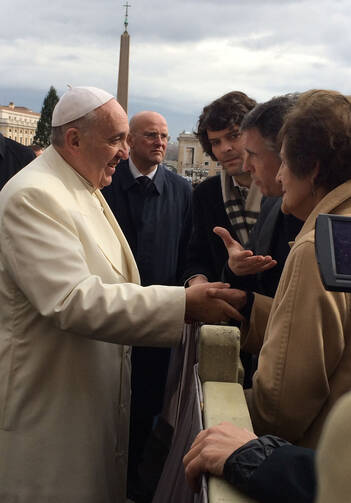The Cross and the Harp
Relations between the Republic of Ireland and the Vatican are beginning to show signs of improvement, after years of strain as a consequence of the sexual abuse crisis. While attending the canonization ceremony for Pope John XXIII and Pope John Paul II on April 27, Prime Minister Enda Kenny announced that Ireland will appoint an ambassador to the Holy See, reopen the Irish Embassy at the Vatican and resume diplomatic ties. Mr. Kenny has also extended to Pope Francis an invitation to visit Ireland. If and when the visit occurs, he promised the cooperation of the Irish government, and he expressed the hope that the pope would also visit Northern Ireland.
The relationship between Ireland and the Catholic Church was nearly fractured in 2011, when the Cloyne Report detailed the extent of sexual abuse in the church in Ireland. The recent moves by Mr. Kenny add to a series of steps of dialogue and conciliation on behalf of Ireland. For example, the historic visit last month of the president of Ireland to Great Britain—a first—reflects a warming trend in Anglo-Irish relations in which all sides are making an effort to come to terms with their shared history.
Not so long ago, it did not seem possible that an Irish president and an English monarch could meet amicably. That extraordinary event can only foster the hope that Ireland and the Vatican can similarly recast their relationship in equally warm tones and resume—and repair—an even longer historical association.
One Way to Peace
Depending on whom you ask, the agreement between rival Palestinian factions Fatah and Hamas to form a unity government represents either a crucial step toward a two-state solution or the death knell for the moribund peace process. Israel suspended negotiations after the deal was announced on April 23, and Prime Minister Benjamin Netanyahu told Palestinian Authority President Mahmoud Abbas that he must choose between reconciliation with Hamas and peace with Israel: “Only one is attainable.”
Mr. Abbas insists he can have both, and indeed that Middle East peace requires Palestinian unity. Several Christian leaders in the Holy Land have echoed that sentiment. Israel is understandably unenthusiastic about the prospect of working with Hamas, a militant Islamic organization that has called for the Jewish state’s destruction and carried out attacks against Israeli civilians. Seeking to placate Israeli and American concerns, a senior Fatah official said that “the reconciliation with Hamas is based on the two-state solution and the 1967 borders. Hamas also accepts all the conditions set by the international community.” Those conditions include recognizing Israel, denouncing violence and honoring past agreements. It is up to Hamas to back up these words.
If the parties follow through on the new pact, Fatah and Hamas will create an independent technocratic government within five weeks and hold elections in six months. That is a big if; two nearly identical unity agreements have collapsed since 2006. But the United States should not encourage the premature demise of this latest attempt by cutting off the $500 million of aid it provides to the Palestinian Authority, which one U.S. official has already threatened as a possible course of action. While the political reconciliation may interfere with the latest round of talks, the peace process has weathered worse. In the long run, Israel also must choose: peace with one Palestine, or no peace at all.
An Irresponsible Congress
When Harry S. Truman ran for president in 1948, he campaigned against what he called the “do-nothing” Republican-led Congress. Throughout his famous whistle-stop tour of the country, he derided what he saw as the inactivity of a Congress that would not deal with the pressing problems of a postwar United States.
Today we have a post-reelection Democratic president trying to get the Republican-led House of Representatives to deal with the pressing problems of a not-yet-postwar America: health care, income inequality, education, race relations, numerous world crises (Ukraine, Syria, South Sudan) and deteriorating national infrastructure—to name just a few. Irrespective of the political divide (which widens all the time), the constant punting of urgent national tasks and needs is indeed a scandal and an unfortunate indictment of our national government.
It is no wonder that when politics and government—and especially politicians—are mentioned, people’s faces reveal deep frustration. Idealism and action have morphed into greed and redaction. On the website of the House of Representatives, our national leaders proudly announce that the dome of the Capitol will undergo a multiyear restoration project to repair the numerous cracks in the windows and walls of that illustrious structure that encloses the “House of the People.” It’s about time. It would be better yet if our national leaders—in all branches of government—would finally get down to business and decide to repair all the cracks in that great edifice of U.S. democracy, starting with how they govern.








